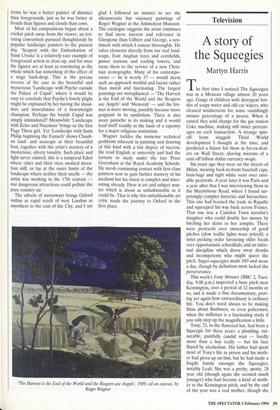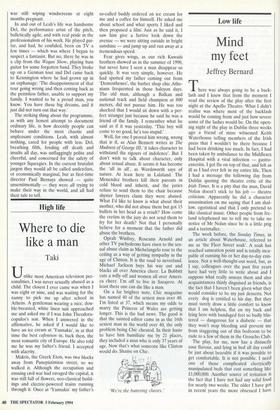Television
A story of the Squeegies
Martyn Harris
The first time I noticed The Squeegies was in a Mexican village almost 20 years ago. Gangs of children with detergent bot- tles of soapy water and old car wipers, who cleaned windscreens for some vanishingly minute percentage of a peseta. When it rained they sold change for the gas station Coke machine, making still tinier percent- ages on each transaction. A strange spin- off from sluggish Third World development I thought at the time, and predicted a future for them as for-ex-deal- ers on Wall Street, shaving microns of a cent off billion dollar currency swaps.
Six years ago they were on the streets of Milan, wearing back-to-front baseball caps, bum-bags and tight white vests over envi- able pectorals. A year later it was Paris and a year after that I was interviewing them in the Marylebone Road, where I found sur- prisingly complex histories and hierarchies. This one had learned the trade in Rapallo and squeegied his way back across France. That one was a Camden Town novelist's daughter who could double her money by hitching her skirts to her armpits. There were protocols over ownership of good pitches (slow traffic lights were prized); a strict pecking order favouring older locals over opportunistic schoolkids; and an infor- mal discipline which drove away drunks and incompetents who might queer the pitch. Super-squeegies made £80 and more a day, though by definition most lacked the perseverance.
This week's Forty Minutes (BBC 2, Tues- day, 9.00 p.m.) inspected a busy pitch near Kennington, over a period of 12 months or so, and it made a fine documentary, prov- ing yet again how extraordinary is ordinary life. You don't need always to be making films about Bushmen, or even policemen, when the milkman is a fascinating study if you only step up the magnification a little.
Tony, 23, in the flowered hat, had been a Squeegie for three years: a plodding, vul- nerable, painfully candid man — hardly more than a boy really — but his face flayed by alcoholism. His father had spent most of Tony's life in prison and his moth- er had given up on him, but he had made a fragile family amongst the Squeegies, notably Leah. She was a pretty, spotty, 28 year old (though again she seemed much younger) who had become a kind of moth- er to the Kennington pitch, and by the end of the year was a real mother, though she was still wiping windscreens at eight months pregnant.
In and out of Leah's life was handsome Del, the performance artist of the pitch, balletically agile, and with real pride in the professionalism of his work. He played gui- tar, and had, he confided, been on TV a few times — which was where I began to suspect a fantasist. But no, there he was in a clip from the Wogan Show, playing bass guitar for some forgotten band. They broke up on a German tour and Del came back to Kennington where he had grown up in an orphanage: 'The disappointment of that tour going wrong and then coming back as the penniless father, unable to support my family. I wanted to be a proud man, you know. You have these big dreams, and it just did not turn out that way.'
The striking thing about the programme, as with any honest attempt to document ordinary life, is how decently people can behave under the most chaotic and unpleasant conditions. Leah, with almost nothing, cared for people with less. Del, breathing filth, fending off death and insults all day, was unflaggingly polite and cheerful, and concerned for the safety of younger Squeegies. In the current brutalist jargon they would all be called underclass, or economically marginal, but as first-time director Paul Bernays showed — quite unsentimentally — they were all trying to make their way in the world, and all had their tale to tell.



















































 Previous page
Previous page